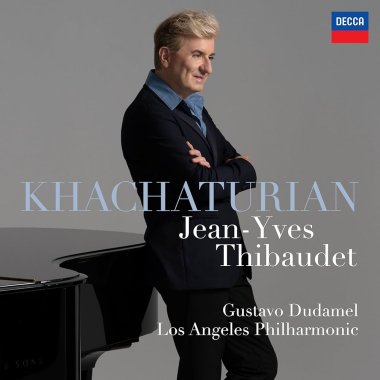
“A labor of love” may be a cliche, but if anything deserves that designation, it is a delightful collection of Aram Khachaturian pieces recorded for Decca Classics by pianist Jean-Yves Thibaudet, with an assist from Gustavo Dudamel and the Los Angeles Philharmonic venturing a bit outside their box.
In his liner notes, Thibaudet writes that he had been trying in vain to get the label to record Khachaturian’s Piano Concerto for more than 20 years. However, Decca had no fewer than four recordings of the concerto in its archives dating back to 1945, when the work was still new. That all of them were more than 50 years old indicates just how long ago the piece fell out of fashion.

Written in the difficult key of D-flat major, Khachaturian’s score further distinguishes itself through its deeply felt Armenian flavor, as well as a barnstorming flamboyance that has put off many critics. Pianist William Kapell ended up practically owning the piece after his 1946 recording with the Boston Symphony Orchestra and esteemed conductor Serge Koussevitzky became a classical bestseller. That performance has been in print almost continuously since and still sounds pretty good for a recording of that vintage.
Thibaudet has been playing the concerto frequently, and he offered a smashing account of it with the BSO and conductor Andris Nelsons at Tanglewood last summer. In this recording, made in November 2023 at Disney Hall, the pianist and Dudamel take tempos that are consistently faster than those of Kapell and Koussevitzky and overall give that older recording stiff competition, even surpassing it in some passages.
Thibaudet plays the first movement more percussively than Kapell, delivering the first cadenza with a crisp, contemporary feel and rendering the second spectacularly, showing off his astounding technique. Thibaudet feels the emotion in the second movement, playing the melody with gentler nuances. We hear the whine of a musical saw, a novel effect that Khachaturian apparently wanted, although the printed score substitutes a flexatone for the sake of convenience. Thibaudet and Dudamel leap into the finale with jauntiness and force. The BSO has the more ravishing strings, yes, but this new recording has lively spirit and punch. Everyone sounds like they are having fun.
On the rest of the well-packed disc, Thibaudet curates a solo tour through some of Khachaturian’s most ingratiating music, these selections recorded in the warmer acoustic of the Colburn School’s Zipper Hall. There is the pianist’s own melting transcription of the famous Adagio from Spartacus, plus Oscar Levant’s transcriptions of the notorious “Sabre Dance” and gentle Lullaby from Gayaneh, which were popular encores in the 1940s and 1950s.
The rare suite of miniatures Pictures of Childhood is drenched with Armenian color, concluding with more music from Gayaneh. Hardly anything is lost in Thibaudet’s skillful transcription of the tuneful Masquerade Suite, and he polishes it off with affectionate bravura.

